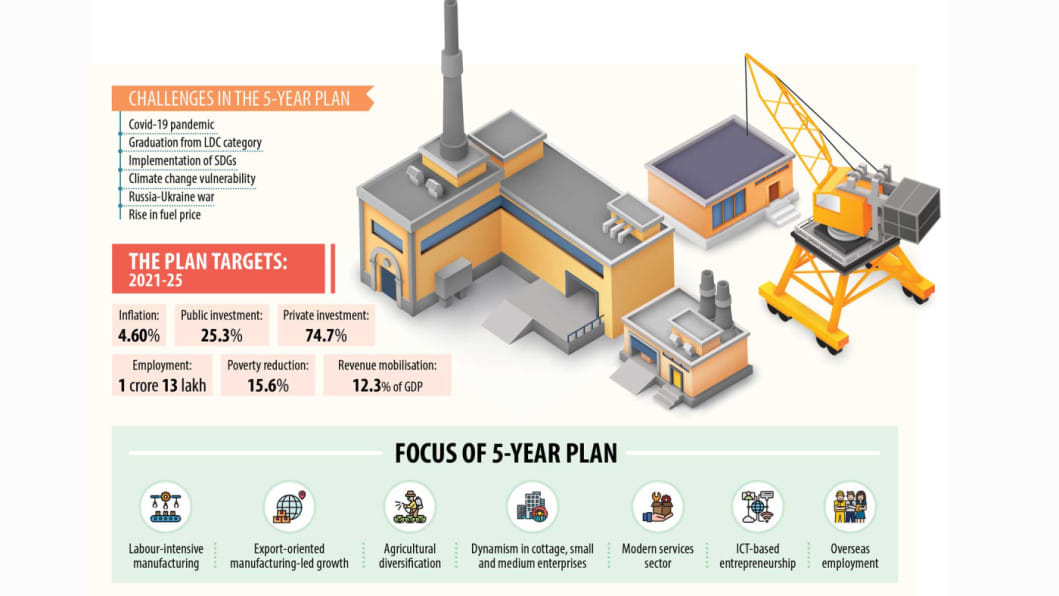New challenges facing five-year plan

Bangladesh will have to deal with the challenges related to the Covid-19 pandemic, graduation from the list of the least-developed country and climate change, and the barriers standing in the way of Sustainable Development Goals during the Eighth Five-Year Plan period.
"Besides, the Russia-Ukraine war, the rise in fuel prices, the disruption in the supply chain, and the currency depreciation are some other major challenges that the government will confront," said Shubhashish Bose, chief executive officer of the Institute of Chartered Accountants of Bangladesh (ICAB).
He made the remarks while giving a presentation at a roundtable on the Eighth Five-Year Plan at the ICAB in Dhaka.
The plan, which will be implemented from 2021 to 2025, has targeted to attain an 8.51 per cent economic growth and reduce the poverty rate to 15.6 per cent, among major goals.
The government also needs to address issues related to the foreign currency reserves, the surge in imports, export development, remittance, inflation, economic growth, tax-to-GDP ratio, foreign direct investment, and human resources development, Bose said.
"Policy measures would drive the issues in a positive direction."
Atiur Rahman, a former governor of the Bangladesh Bank, said the policy that the government has followed in the last decade to help the agriculture sector thrive has involved three main factors.
They are: raising the incomes of farmers and creating jobs for the youth by facilitating the marketing of farm produce at home and abroad; increasing the productivity of growers; and paying attention to cultivating high-value crops.
"The policy has been continued in the Eighth Five-Year Plan. It will help the economy recover from the impacts of the pandemic and the war. We will have to keep the momentum. So, implementing the plan has become more important than ever," said Prof Rahman.
The noted economist warned although there might not be any food crisis in the country, higher food prices may pose a challenge.
So, he urged the government to supply fuel oil, which is used to irrigate land for rice cultivation, to farmers at reasonable rates by increasing subsidies if needed.
Muhammad Abdul Mazid, a former chairman of the National Board of Revenue (NBR), called for executing the plan properly so that the targets could be reached.
The tax net has to be increased. At the same time, taxpayers' money has to be spent properly so that people can see the benefit of their contribution, he said.
"This will encourage people to pay more taxes," he said, suggesting the government allow the NBR to set its tax collection target.
Mazid recommended fast-tracking the implementation of the projects that have been taken to automate the tax administration and the services it provides.
Zaidi Sattar, chairman of the Policy Research Institute of Bangladesh, said the average tariff rate in Bangladesh is higher compared to other countries. "This has to be brought down."
"We only talk about the diversification of exports and markets. But the overall economy needs diversification," said M Masrur Reaz, chairman of the Policy Exchange of Bangladesh.
"The government should explore ways to encourage private investment and attract FDI."
Prof Shamsul Alam, state minister for planning, said the country might need more than expected time in reducing the poverty rate to the desired level.
"We are facing some pressure under the current circumstances. But the situation is not that disappointing."
The average inflation in the last fiscal year was 6.15 per cent, overshooting the target of 5.7 per cent. The government has set a target to bring it down to 4.6 per cent in 2025.
"We are giving highest attention to inflation management," the state minister said.
The state minister also said the government would have to pay heed to raising income taxes and phase out tax exemptions gradually as the country graduates from the LDC group.
"There has to be a change in mindset among the business community that they will not get the same facilities they are currently enjoying from the government once the country becomes a developing nation in 2026," said Mustafa Abid Khan, a former member of the Bangladesh Trade and Tariff Commission.
Ferdaus Ara Begum, chief executive officer of the Business Initiative Leading Development, a private think-tank, emphasised appropriate data management.
New policies and regulations will be required in the areas of patent and tax, she said.
"Allocation for projects and their implementation has to be ensured as per plans, and governance has to be guaranteed."
Shahadat Hossain, president of the ICAB, also spoke at the discussion.

 For all latest news, follow The Daily Star's Google News channel.
For all latest news, follow The Daily Star's Google News channel. 








Comments